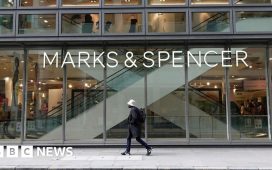A drug used to treat breast cancer has now been licenced for preventative use and will be offered to almost 300,000 women, in what has been hailed as a ‘major step forward’ for patients with a family history of the disease.
Around 289,000 post-menopausal women in England who are at a moderate to high risk of breast cancer will be offered anastrozole in the hope it will stop them developing the illness.
Anastrozole, a hormone therapy, lowered breast cancer cases by almost 50% during trials of eligible women over an 11-year period.
The protective effect of the drug can last for years after a woman stops taking it, medics have said.
Officials estimate that if 25% of eligible women in England accept the drug – and half of those take it for the recommended five years – then 2,000 cases could be prevented over their lifetimes.
Around 47,000 women are diagnosed every year with breast cancer, which is the most common cancer in the UK.
The breakthrough follows anastrozole becoming the first drug to go through NHS England’s Medicines Repurposing Programme.
It was initially recommended as a preventative option by the National Institute for Health and Care Excellence (NICE) in 2017, however the treatment was unlicenced for this use, resulting in a low uptake.
Baroness Delyth Morgan, chief executive at the charity Breast Cancer Now, said: ‘The extension of anastrozole’s licence to cover it being used as a risk-reducing treatment is a major step forward that will enable more eligible women with a significant family history of breast cancer to reduce their chance of developing the disease.’
NHS chief executive Amanda Pritchard added: ‘It’s fantastic that this vital risk-reducing option could now help thousands of women and their families avoid the distress of a breast cancer diagnosis.
‘Allowing more women to live healthier lives, free of breast cancer is truly remarkable, and we hope that licensing anastrozole for a new use today represents the first step to ensuring this risk-reducing option can be accessed by all who could benefit from it.
‘This is the first drug to be repurposed though a world-leading new programme to help us realise the full potential of existing medicines in new uses to save and improve more lives on the NHS.
‘Thanks to this initiative, we hope that greater access to anastrozole could enable more women to take risk-reducing steps if they’d like to, helping them live without fear of breast cancer.’
The drug – a 1mg tablet taken once a day for five years – works by cutting down the amount of oestrogen a patient’s body makes by blocking an enzyme called aromatase.
Common side effects include hot flushes, weakness, joint pain / stiffness, arthritis, skin rash, nausea, headaches, osteoporosis and depression.
Anastrozole joins two other licenced drugs, tamoxifen and raloxifene, in the NHS’s arsenal to prevent breast cancer.
Breast cancer symptoms
The first symptom of breast cancer that most women notice is a lump or an area of thickened tissue in their breast.
You should see a GP if you notice any of the following:
- a new lump or area of thickened tissue in either breast that was not there before
- a change in the size or shape of one or both breasts
- a discharge of fluid from either of your nipples
- a lump or swelling in either of your armpits
- a change in the look or feel of your skin, such as puckering or dimpling, a rash or redness
- a rash (like eczema), crusting, scaly or itchy skin or redness on or around your nipple
- a change in the appearance of your nipple, such as becoming sunken into your breast
Health minister Will Quince said of the development: ‘Breast cancer is the most common cancer in the UK so I’m delighted that another effective drug to help to prevent this cruel disease has now been approved.
‘We’ve already seen the positive effect anastrozole can have in treating the disease when it has been detected in post-menopausal women and now we can use it to stop it developing at all in some women.’
Last week it was revealed that thousands of women diagnosed with early stage breast cancer could be spared unnecessary surgery and radiotherapy thanks to a ground-breaking new study helping to identify high-risk cases.
Research also found adults need better education on the wide range of breast cancer symptoms.
Almost all adults recognise a lump as a symptom of breast cancer, but less than half can spot other common symptoms.
Get in touch with our news team by emailing us at webnews@metro.co.uk.
For more stories like this, check our news page.
Get your need-to-know
latest news, feel-good stories, analysis and more
This site is protected by reCAPTCHA and the Google Privacy Policy and Terms of Service apply.












